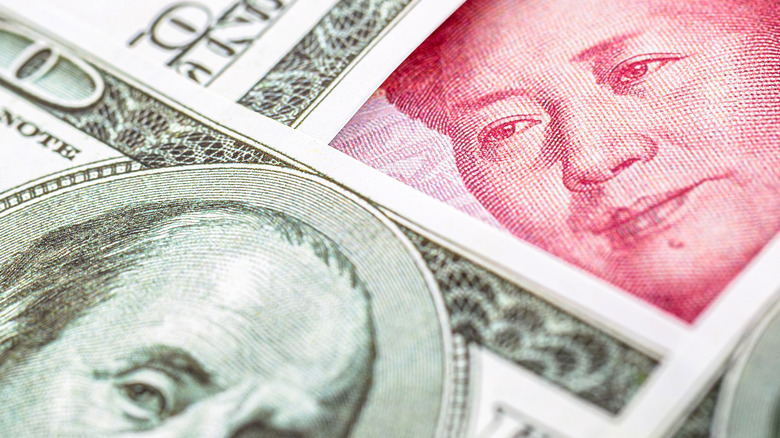The Amount Of US Debt That China Owns Will Make You Pause
The United States is in debt with China for hundreds of billions of dollars, yet that sum is miniscule when compared to the total national debt, and the amount of debt owed to other bond holders. As of 2025, China's central bank owns a 2.1% share of America's nearly $37 trillion deficit, according to an analysis of U.S. Treasury data by the Pew Research Center. That amounts to $756.3 billion, which pales in comparison to the $7.4 trillion that the federal government owes itself for programs such as Social Security, or the $4.6 trillion owed to the Federal Reserve. On top of that, another $4.5 trillion is owed to mutual funds, $1.9 trillion is owed to U.S.-based banks, and $1.7 trillion is owed to state and local governments.
Plus, China is not even the largest foreign owner of U.S. debt. That title belongs to Japan, which owns 3.1% of the United States' deficit, or $1.1 trillion, followed by the United Kingdom, which owns 2.2%, or $809.4 billion of U.S. debt. Nevertheless, many politicians and economists worry about China's financial stake. With that said, the real issue is not who owns the debt, but the debt itself. In Q2 2025, U.S. debt was 119.4% of the country's GDP, per the Pew Research Center. Adding to this, the deductions and tax breaks from the One Big Beautiful Bill Act will likely cause the national debt to grow to $52 trillion by fiscal year 2035. High interest rates are similarly hurting the situation, with the cost of interest alone in 2024 at $879.9 billion, more than the amount spent on Medicare.
China has been shedding U.S. debt
China's central bank buys U.S. Treasury bonds with the surplus U.S. dollars that it receives from Chinese companies that sell assembled goods to the U.S., according to Investopedia. In other words, buying U.S. debt is a great way for China's government to prop up its export economy. And, with the effective end of the gold standard in the 1970s, American Treasury bills are considered one of the safest investments in the world. However, President Trump's recent tariffs on Chinese goods has created concern that the debt China owns could be used as a much more potent economic weapon against the U.S. than retaliatory tariffs would be. Selling off American bonds at discount prices could be a way to devalue the dollar — though that could ultimately create harmful consequences for China.
However, such a move has grown less likely in recent years as China has steadily reduced its stake in U.S. debt. In May 2022, China's ownership of U.S. debt fell below $1 trillion for the first time since May 2010, CNBC reported. Some reasons for divestment include China's desire to strengthen its own currency, the yuan, as well as its need to manage its own slowing economy — due in large part to the COVID-19 pandemic and growing trade barriers. Meanwhile financial institutions in London are acting as a conduit for any hedge funds hungry for U.S. debt, hence why the U.K. took over the No. 2 spot from China in summer 2025.

